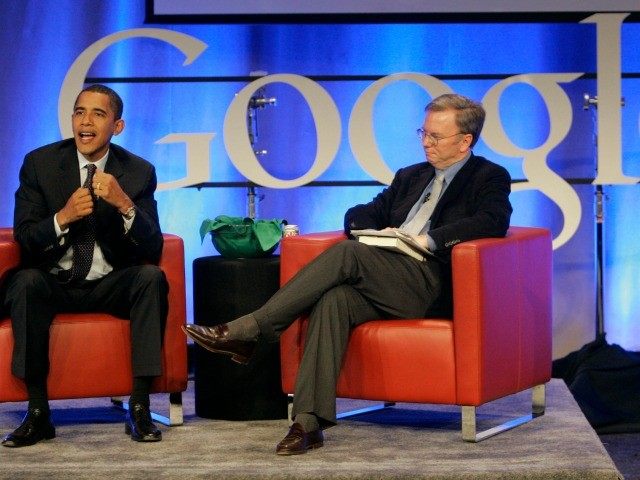Internet giant Google has been one of the strongest political backers of President Barack Obama. As the Obama tenure in the White House comes to an end, several recent regulatory decisions have benefited Google handsomely.
The symbiotic relationship has been good for both Obama and the titans of Mountain View.
In the 2012 election cycle, Google employees donated a princely $804,249 to President Obama’s re-election effort. Only employees at Microsoft and the University of California donated more, and each have more than double the number of employees as Google. In 2008, Google employees contributed $817,855 to Obama’s election campaign.
Google’s Eric Schmidt served on Obama’s President’s Council of Advisors on Science and Technology, and provided valuable input on Obama’s 2012 campaign. Schmidt helped the Obama campaign recruit talent and coached the campaign manager on leadership. Schmidt even invested in a data start-up headed by veterans of the Obama campaign.
Obama also appointed a non-registered Google lobbyist, Vint Cerf, to the National Science Board. Last year, the Wall Street Journal reported that someone from Google attended a meeting at the White House an average of once a week throughout Obama’s tenure in office.
Now, in the final months of the second Obama term, Google has been the beneficiary of favorable decisions from federal agencies ranging from the Federal Communications Commission (FCC) to the National Highway Traffic Safety Administration (NHTSA).
The FCC is handling its “set-top” box proceeding, ostensibly aimed at freeing TV viewers from expensive, restrictive contracts with cable providers, in a way that would greatly benefit Google whether seen from the perspective of giving Google a ton of new advertising data it currently lacks or giving the tech giant access to other entities’ content on uniquely favorable terms.
Because of Google’s relationship with T-Mobile, depending on how the FCC handles its spectrum auction, the agency could also be set to give the company a big boost in that realm, too. Google itself will not participate in the auction, removing a potentially large bidder from the sale. Google has close ties with T-Mobile, however, and the wireless carrier will be bidding on the auction.
And the FCC is also doing Google a big favor in pre-empting states from regulating Google Fiber. As Google’s own lawyer has noted, regulating Google under the federal Title II could give the company access to other companies’ hard infrastructure, such as telephone poles—a big boost to Google.
Meanwhile, NHTSA is giving Google and its self-driving cars another regulatory handout. According to Reuters, “NHTSA will interpret ‘driver’ in the context of Google’s described motor vehicle design as referring to the (self-driving system), and not to any of the vehicle occupants,” something that increases the commercial viability of Google’s driverless cars substantially. In other words, the Google’s on-board computer will be considered by the Feds to be a “driver,” clearing lots of hurdles for self-driving cars to hit the road.
Another big benefit to Google was announced by President Obama himself, when he announced the company would be the first American Internet Service Provider to be let into Cuba. Critics also allege that Google may be benefiting from the creation of new “Digital Attaches” at U.S. Embassies abroad, and from terms of free trade agreements sought by the Obama administration.
Earlier this year, the federal government announced an end to its nearly two-year anti-trust investigation of Google’s search business. In a break with precedent, the FTC accepted voluntary changes from the company rather than a formal consent decree. One FTC Commissioner even warned that the lack of a consent decree freed Google to reinstate anti-competitive practices at any time.
Of course, there’s nothing wrong with anyone—corporation or individual—advocating for their position and benefiting from sound, limited government policy. In Google’s case, however, they provided critical support for President Obama’s election. The President has pursued a heavy, interventionist policy in almost every other industry sector.
Google has not only escaped the heavy hand of government regulation, but, in a number of cases, it has benefitted from specific government decisions that have helped its businesses. That looks a lot less like an individual entity benefiting from free markets and a lot more like buying special, pricey favors, to the potential disadvantage of competitors. In other words, a kind of high-tech crony capitalism. One wonders if you can google that.

COMMENTS
Please let us know if you're having issues with commenting.